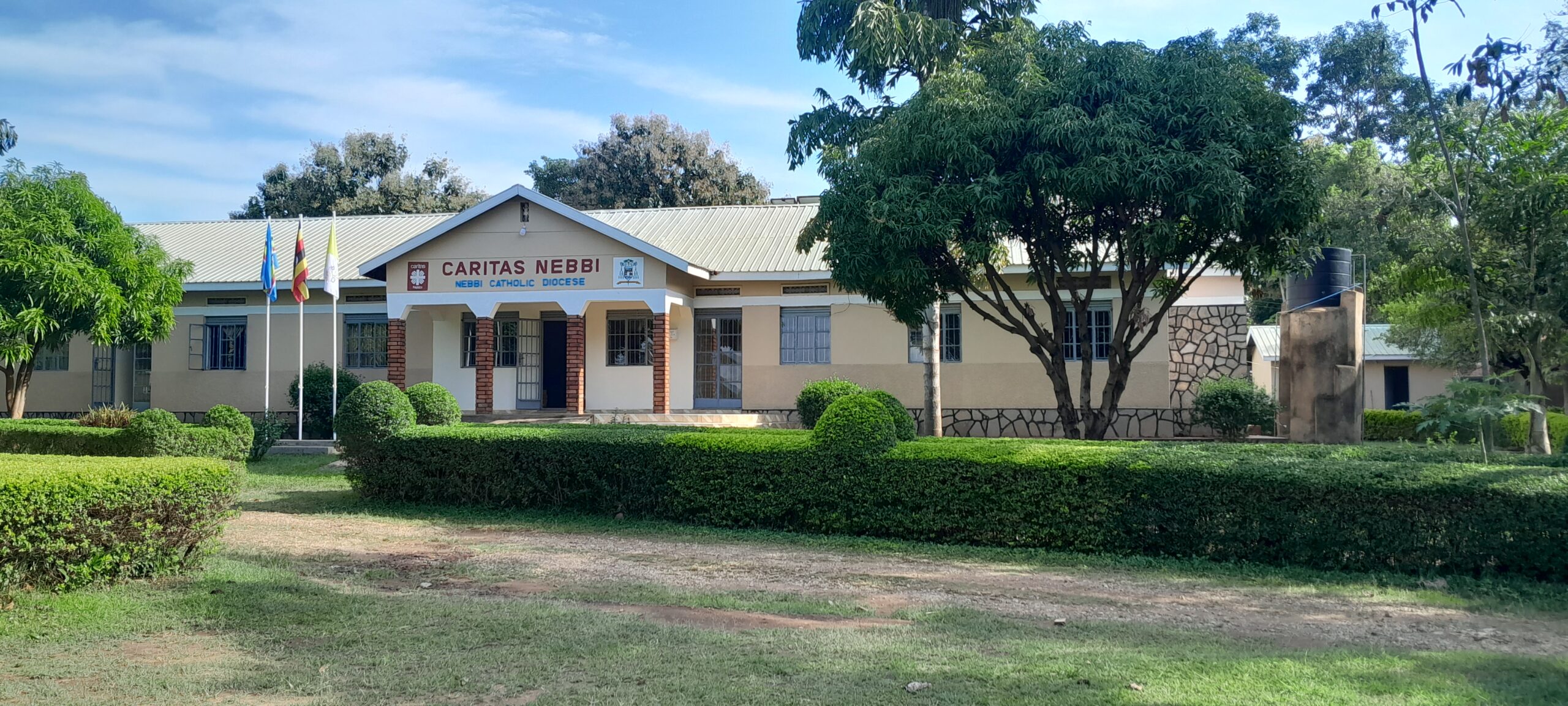About Caritas Nebbi
Caritas is the Latin word for Charity, and Charity is LOVE PUT INTO PRACTICE. As an organized institutionalized way of standing by THE POOR in the Name of Jesus, it began in Germany in 1897. But, as GOD AMONG HIS PEOPLE, it is as everlasting as God himself.
Background
Caritas Nebbi is the socio-pastoral development arm of Nebbi Catholic Diocese. It came into being with the creation of Nebbi Catholic Diocese on the 23rd February 1996 by Pope St. John Paul II. Caritas Nebbi is a member of Caritas Uganda, the socio-pastoral development arm of the Uganda Episcopal Conference, and ultimately also a member of Caritas Internationalis headquartered in Rome, at Palazzo San Callisto, which forms part of Vatican City.
A Documentary about Nebbi Catholic Diocese
Mandate & Scope
Caritas Nebbi, operating under the Bishop’s guidance, is committed to serving all people within Pakwach, Nebbi, Zombo, and Madi-Okollo District irrespective of their faith or lack thereof. Our experienced and qualified staff dedicate themselves to transforming lives, moving individuals from perennial hardship to perpetual prosperity, through our core pillars of Sustainable livelihood, Environment protection, Integrated Community and Human Health, Micro finance, Good governance, Social protection and access to Justice, Relief and emergency Response and institutional Development.
We ensure holistic and transparent intervention management, using both local charity contributions and external funding, delivering services with the love and dedication that embodies the spirit of Christ. Our mission is to touch lives, in still hope, and serve those at the fringes of humanity with utmost compassion and dedication.
Vision, Mission and Goal
With “Life in it’s Fullness for All”, we envision a peaceful and prosperous society where self-reliance, love and care for the most vulnerable prevail.
Our mission is To work towards the liberation from everything that oppresses human kind.
Organizational Objectives
To improve the Socio-economic living conditions of the people in Nebbi Catholic Diocese,
To enhance people’s informed participation in Human Rights, Good Governance and Democracy issues in Nebbi Catholic Diocese,
To enhance a peaceful environment where men and women mutually recognize and support each other in development undertakings.
To enhance institutional capacity for development and sustainability.
Our Core Values
- Charity:The act of showing love, compassion and generosity towards others in need, especially those who are less fortunate or marginalized
- Solidarity: The powerless and the excluded will be the basis of our commitment to the fight against poverty.
- Sacrifice: The willingness to give up something valuable or important for the benefit of others, particularly those in need
- Conviviality: Fostering a sense of warmth, friendliness, togetherness and creating a welcoming and inclusive atmosphere where people come together, share and support one another.
- Justice: We believe you cannot make a gift of something a person should already have by right. We challenge economic, social, political and cultural structures opposed to a just society
Thematic Core Program Areas
- Sustainable Livelihood
- Environment protection
- Integrated Community and Human Health
- Micro finance
- Good governance
- Social protection and access to Justice
- Relief and emergency Response
- Institutional Development
Management
The bishop is its President and it is for the service of Charity in his diocese that Caritas Nebbi exists. He appoints the Board to whose counsel he listens when making policies. He then appoints the Director Caritas Nebbi to whom he delegates the Board policies for execution. The Director, with the help of God-fearing, loyal and professional staff, takes the love of Christ to all peoples, most especially those who find themselves in the furthest existential peripheries.
Beneficiaries
Caritas Nebbi takes an interest in everyone. However it is primarily involved in bearing witness on behalf of, and working for, the powerless, the voiceless, the homeless, the hungry, the exiled, the marginalized, the exploited, the abandoned, the defenceless, in the Name of Christ.
Stakeholders
Caritas Nebbi’s stakeholders are persons, groups or organizations with interests in, or concern about her including those who may influence the outcomes. They may also be parties who either affect or are affected by the Caritas Nebbi’s actions or non – actions.
Primary Stakeholders
These are the real beneficiaries of all the activities implemented under Caritas Nebbi programs and projects. Given the holistic nature of Caritas programs, it is evident that all people in operational areas benefit from the organization’s initiatives. Specifically, we have individual farmers, farmers groups, associations and cooperatives.
Others are women, youth, children and people with disability, orphans and people living with HIV/AIDS. From the above categories of people listed, it can be deduced that many among the marginalized people are our stakeholders. The most challenging issue with this category is the high dependency syndrome that is likely to hamper new innovations that aim at creating a self-reliant and sustaining society.
Secondary Stakeholders
This involves a list of service providers and collaborators, Diocesan Departments and Institutions, Local government, NGOs, CBOs, which work hand in hand with Caritas Nebbi.
Key Actors
The key actors include; Diocesan Development Commission, Caritas Nebbi Board, Caritas Nebbi Technical Support Team, Caritas Nebbi Staff, Caritas Nebbi Development Partners that fund the various development programs. In the resent past the major development partners include; Caritas Uganda, Caritas Norway, Bread for the World, Swiss Hand Foundation, Cordaid, Manus Unidas, Diocese of Rottenburg – Stuttgart Germany, Archdiocese of Dublin, CAFORD, VMM, Hiltonfund for Sisters, USAID (CARDNO – Emerging Linkages), CSF, TASO, Caritas Prague, AFARD, ACFACE, Life Concern, WENIPS, NEBBI NGO Forum, Government of Uganda Government, TROCAIRE and Foundation for Sustainable Development among others.


